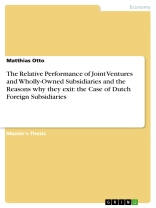Master’s Thesis from the year 2009 in the subject Business economics – Company formation, Business Plans, grade: 2, University of Amsterdam, language: English, abstract: Using data on more than 200 foreign entries made by Dutch MNEs between 1995 and 2003, this study examines the relative performance of jointly-owned and wholly-owned affiliates and sheds light on the underlying reasons why these two types of affiliates exit. By employing performance measures such as average longevity and exit rate, and by differentiating between exits through liquidations and those through sell-offs, I find that there are no essential performance differences between WOSs and JVs, which is in line with the results of prior scholarship (e.g. Dang, 1977; Chowdhury, 1992; Chan, 1995; Mata & Portugal, 2000; Pangarkar & Lim; 2003; Delios & Beamish, 2004). Furthermore, the findings reveal that both WOSs and JVs mainly exit voluntarily. The most prevalent reason for WOS exit is strategic restructuring, whereas the most common reason for JV exit is fierce competition in the host market. Finally, I discover supporting evidence for the proposition that MNE parents are more likely to buy out local partners from JVs over which they have majority ownership than from JVs over which they have minority ownership.
Matthias Otto
The Relative Performance of Joint Ventures and Wholly-Owned Subsidiaries and the Reasons why they exit: the Case of Dutch Foreign Subsidiaries [EPUB ebook]
The Relative Performance of Joint Ventures and Wholly-Owned Subsidiaries and the Reasons why they exit: the Case of Dutch Foreign Subsidiaries [EPUB ebook]
Mua cuốn sách điện tử này và nhận thêm 1 cuốn MIỄN PHÍ!
Ngôn ngữ Anh ● định dạng EPUB ● ISBN 9783869435213 ● Kích thước tập tin 2.7 MB ● Nhà xuất bản GRIN Verlag ● Thành phố München ● Quốc gia DE ● Được phát hành 2012 ● Phiên bản 1 ● Có thể tải xuống 24 tháng ● Tiền tệ EUR ● TÔI 5466306 ● Sao chép bảo vệ không có












